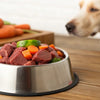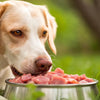Can You Add Raw Egg to Dog Food? Exploring the Benefits and Risks
- Houndsy
Table of Contents
- Introduction
- The Nutritional Value of Eggs for Dogs
- Can Dogs Eat Raw Eggs?
- Are Cooked Eggs a Better Option?
- How Often Should You Feed Your Dog Eggs?
- Can Dogs Eat Eggshells?
- Are There Any Allergies to Consider?
- Conclusion
Introduction
Did you know that many pet owners are increasingly curious about enhancing their dog's diet with raw ingredients? This trend has sparked debates on what food additions can provide optimal nutrition for our furry friends. One such food item that often comes up in discussions is the humble egg. As dog owners, we want to ensure that our pets receive a balanced diet that promotes health, vitality, and happiness, but the question remains: can you add raw egg to dog food?
In this blog post, we will dive deep into the benefits and risks associated with incorporating eggs into your dog's diet. By the end, we'll provide clarity on how to safely include eggs, whether raw or cooked, and the best practices to follow. We will also reflect on how your dog’s feeding routine might benefit from simplicity and innovation—especially with our flagship product, the Houndsy Kibble Dispenser, that transforms the dog-feeding experience into a convenient, consistent, and beautiful ritual.
Let’s embark on this journey of discovery together and explore how eggs can fit into your dog’s diet!
The Nutritional Value of Eggs for Dogs
Eggs are often celebrated as one of nature's most complete and nutritious foods. For dogs, eggs can serve as an excellent source of:
- Protein: Eggs provide a high-quality protein source that contains all essential amino acids necessary for optimal health.
- Vitamins and Minerals: Eggs are rich in vitamins like A, B12, D, and E, along with minerals such as selenium and zinc. These nutrients support immune function, skin health, and metabolic processes.
- Healthy Fats: The fats in eggs contribute to a shiny coat and healthy skin, essential for overall wellness.
- Amino Acids: Eggs contain important amino acids, including taurine, which supports heart and eye health, as well as muscle maintenance.
Summary of Key Nutrients in Eggs
| Nutrient | Benefits |
|---|---|
| Protein | Supports growth and repairs tissues |
| Vitamin A | Essential for vision and immune function |
| Vitamin B12 | Vital for red blood cell formation and brain health |
| Selenium | Antioxidant that helps to protect your dog's cells |
| Healthy Fats | Nutritional support for skin and coat |
| Essential Amino Acids | Important for maintaining overall health and muscle integrity |
By understanding the nutritional advantages eggs provide, we can assess their place within our dogs' diets.
Can Dogs Eat Raw Eggs?
The short answer is yes, dogs can eat raw eggs. Many enthusiasts of raw feeding include raw eggs in their dogs' diets to take advantage of their full nutritional potential. However, this decision isn't without its considerations, particularly concerning safety.
Potential Risks of Feeding Raw Eggs
While many dogs tolerate raw eggs well, some risks need to be acknowledged:
-
Salmonella Risk: Raw eggs can be contaminated with bacteria such as salmonella, which poses a health risk to both dogs and humans. Although dogs have a more robust digestive system capable of handling some bacteria, ill dogs or those with compromised immune systems should avoid raw eggs.
-
Biotin Deficiency: Egg whites contain a substance known as avidin, which can inhibit biotin absorption if consumed excessively. Biotin is crucial for skin health and metabolic function. However, this risk is minimal when eggs are fed in moderation as the yolk is rich in biotin.
Feeding Recommendations
For those inclined to incorporate raw eggs into their dog's feeding routine, consider the following:
- Use only high-quality, fresh eggs from trusted sources.
- Monitor your dog for any signs of allergic reactions or digestive issues after introducing raw eggs.
- Employ good hygiene practices when handling raw foods to minimize bacterial risk.
Are Cooked Eggs a Better Option?
For pet owners concerned about the risks associated with raw eggs, cooked eggs are an equally beneficial alternative. Cooking eggs reduces the risks posed by bacteria while retaining most nutritional value.
Cooking Methods
Here are several recommended cooking methods for eggs that can be safely added to your dog's meals:
-
Boiled Eggs: Hard-boiled or soft-boiled eggs are quick and easy ways to serve eggs. Simply remove the shell and cut them into manageable pieces for your dog.
-
Scrambled Eggs: Lightly scramble eggs without using salt, butter, or oil. This method allows for easy mixing with your dog's regular food.
-
Poached Eggs: Poaching eggs without any additives ensures that they retain their nutritional content while still being safe for your dog.
Given their versatility, eggs can be served in various forms to keep mealtime interesting for your canine companion.
How Often Should You Feed Your Dog Eggs?
Moderation is essential when adding any new food item to your dog’s diet, and eggs are no exception. Depending on your dog's size and dietary needs, here's a general guideline on how many eggs to feed:
- Small Dogs: 1 egg per week
- Medium Dogs: Up to 2 eggs per week
- Large Dogs: 2-3 eggs per week
Calculating Egg Intake
Since eggs contain approximately 55–75 calories each, it’s important to account for these extra calories within your dog's daily caloric intake. Adjust their meals accordingly to maintain a balanced diet.
Can Dogs Eat Eggshells?
Yes, eggshells can be beneficial for dogs as they are rich in calcium, which supports healthy bones and teeth. If you decide to offer eggshells, follow these guidelines:
- Wash and Dry: Clean eggshells thoroughly to eliminate any residual bacteria.
- Grind into Powder: Grinding eggshells minimizes choking hazards and makes them easier for your dog to digest.
- Introduce Slowly: Start with small amounts to monitor your dog’s reaction before fully integrating eggshells into their diet.
Potential Benefits of Eggshells
- Calcium Supply: Eggshells provide a natural source of calcium.
- Joint Health: Eggshell membrane has been shown to help alleviate joint issues in some dogs.
Are There Any Allergies to Consider?
Like with any food, some dogs may develop allergies to eggs. Breeds such as Cocker Spaniels and Labradors, in particular, may be more susceptible to dietary allergies.
Signs of Egg Allergy
Be vigilant for signs of an allergic reaction, including:
- Vomiting
- Diarrhea
- Skin issues (itchiness, rash)
- Breathing difficulties or swelling
If your dog displays any of these symptoms after consuming eggs, consult your veterinarian immediately.
Conclusion
So, can you add raw egg to dog food? Yes, incorporating eggs—whether raw or cooked—can be a great addition to your dog's diet, provided that it is done safely and in moderation. Eggs provide a wealth of nutritional benefits that can enhance the overall health and well-being of your canine companion. Still, it is important to be mindful of potential risks, allergies, and proper feeding practices.
As you consider the best options for your dog's feeding routine, think about making it even more convenient and beautiful with the Houndsy Kibble Dispenser. Our innovative design ensures that your pet receives perfectly portioned meals at the push of a crank—without any bending or mess. Explore the transformative experience of seamless dog feeding here.
Frequently Asked Questions
Are eggs good for dogs?
Yes, eggs are a nutritional powerhouse packed with protein, vitamins, and minerals.
Can my dog eat raw eggs?
Dogs can consume raw eggs, but it’s essential to monitor for salmonella risk and ensure the eggs come from safe sources.
Is it safe to feed my dog eggs every day?
While dogs can handle eggs regularly, it’s best to limit them to a few per week.
What about soft or hard-boiled eggs?
Both soft and hard-boiled eggs are perfectly safe and healthy for dogs when prepared appropriately.
Can dogs have shells?
Eggshells are safe for dogs and provide calcium; however, they should be ground up to prevent choking hazards.
If you're curious about what else you can do to enhance your dog's feeding experience, don't hesitate to reach out or explore our unique product offerings!












